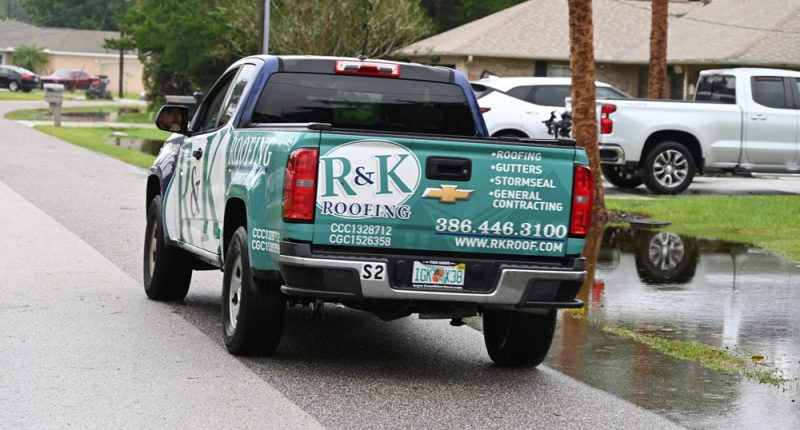
Palm Coast may finally revise its commercial-vehicle ordinance, removing a ban on the parking of commercial vehicles in residential driveways. The proposed allowance would apply to commercial pick-up trucks, work vans and similar work trucks, including trucks with ladders and racks and a few other allowances.
Commercial messaging–or any messaging, including political, poetic or polemical messaging–willl no longer have to be covered up if it exceeds 3 square feet on each side.
The Palm Coast City Council on Tuesday directed its administration to amend the code relating to commercial vehicles accordingly. Bans will remain in place for larger vehicles, such as Mack trucks, dump trucks, tractors, utility trailers, commercial limousines and other large-sized vehicles. The code enumerates allowed and disallowed vehicles.
“My intent is to be more business-friendly, and I think it can be accomplished pretty easily,” Council member Theresa Pontieri said. She proposed removing the regulation that prohibits any signs exceeding 3 square feet. She prefers the term “work vehicles, not commercial vehicles.” She does not think it would be an unreasonable change, nor would it alter the residential character of neighborhoods.
The proposal will have to go through two public hearings and two votes by the council before it is approved. That proposal is expected in coming weeks. It will likely go through as close a reading by the council as did the short-term rental ordinance.
Mayor Mike Norris, noting his previous employment with the Florida Department of Transportation (he was a safety compliance officer from 2013 to 2016), said “what we’re dealing with here, basically is signage and advertising on vehicles within the community,” not the parking of large trailer trucks.
Council member Ty Miller wanted to relax rules for work trucks with ladders and other tools of the trade for many tradespeople. He does not think they should have to loan and unload their supplies, ladders included, just to park in their driveways. “We’re allowing the rack, but we’re asking them to remove the ladder nightly,” Miller said.
“What about pipes, wood? I’m just thinking other equipment?” Council member Charles Gambaro asked. “What about trailers? The box trailers. Then I go back to the short-term discussion about boat trailers.” (The city’s new short-term rental ordinance prohibits the parking of boat trailers in front of short-term rentals. Gambaro has been stressing consistency in city ordinances.) There are also culvert and plumbing pipes, and numerous other equipment that can hang off the bed of trucks.
“We’ve got to draw the line somewhere,” Pontieri said.
Norris said he had no objection to any signs as long as they are not offensive. Chief of Staff Jason DeLorenzo cautioned the council, however, about policing sign content. Over a decade ago the Supreme Court ruled that local governments may regulate the location, the size and the timing of signs. But they may not regulate the content of signs, once signs are permitted within those parameters. The city recently updated its ordinance. Last year the council opted against loosening rules for Realtor signs to avoid slipping down the kind of slope that would open the way to all kinds of signs.
“So if a neighbor has an issue with a certain political party or their neighbor themselves, they could plaster that on their vehicle, and we will not be able to do anything about that, because wording will now be allowed on vehicles,” DeLorenzo said.
“Which is the case now if they stay within the three feet, right?” Miller said, accurately. Norris raised no objections, and supports the overall approach.
“It’ll free up code because, you can’t enforce everything,” the mayor said. “ I said this for a while now. Palm Coast is not an HOA.”
In fiscal year 2024 (from October 2023 to September 2024), the city got 1,072 complaints about commercial vehicles. Of those, the city’s Code Enforcement Board heard 119 cases. So far this year there’s been 888 complaints, of which the board heard 80.
Still, relaxing the working-vehicle rule has invariably drawn impassioned responses for and against every time the council has considered the issue.
So it’s been in Palm Coast since the origin of the city. The City Council has maintained a relatively hard rule against the parking of commercial vehicles in residential driveways. Workers have had to park their vehicles elsewhere, paying at times hundreds of dollars a month for storage and extending their work day in drives back and forth to the storage unit. Or they’ve had to cover up their vehicles.
“Think about the AC worker who is on call,” Pontieri said. “My dad owns a pest control company. He gets called out to remove rats from rat traps out of attics on Sundays at 11 o’clock at night. He has a work vehicle, so in the neighborhood that he lives in, he has to go and take all these magnets or whatever off at 11 o’clock at night to go get somebody’s rat out of their attic. And I can tell you, when they want to run out of their attic, they want it out now. When you want your AC on, you want it out now.”
In 2010, after the chamber of commerce tried to eliminate the rule at least for work vans and the like, the council allowed commercial vehicles to park during lunch hours, or to park overnight as long as they are covered with tarps. The city did not set standards for tarps, which could be uglier than the signs they cover.
The council came close to relaxing the rule significantly in 2021. That year, a non-scientific poll the city conducted found residents split 49-49 on the proposal, though both in form and responses, the survey was flawed: a single IP address returned over 2,000 votes against relaxing the rule, with the top 20 IP addresses accounting for almost 6,000 votes between them, out of 16,491 responses. An attempt to repeal the rule failed in a 3-2 vote.
The few people who addressed the council Tuesday reflected the split that typically frames the discussion, with some residents asking: “where does it stop,” one said.
Another, who runs a business out of his home, said his home has three liens from over $10,000 fines he’s accumulated for having a work truck in his driveway. “I get so much business off my truck. It’s incredible. I don’t know where my business would be without that,” he said.
“You’re running people like me out of here, is what’s happened,” he said. “If you’re not going to be supportive of small businesses like myself, then you’re just running me out of here. And if I got to go and live in Volusia County or St. Johns County, all that’s going to do is raise my prices and things of that nature. So it’s really, really making it hard. So I love this conversation.”
![]()







